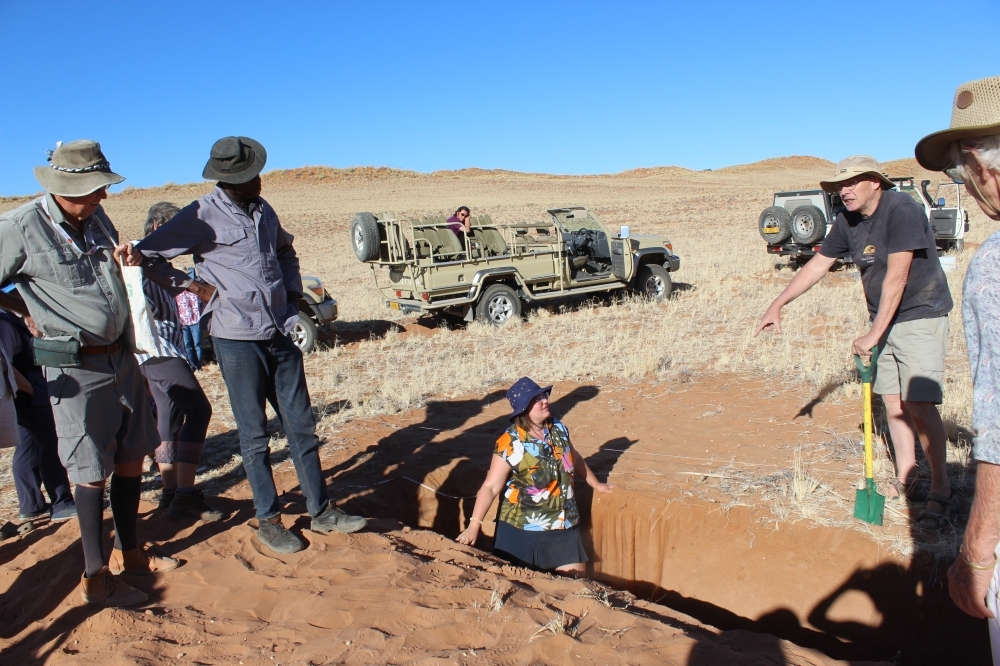Namibia, like many other countries, is not immune to drought and its ensuing impacts on the economy.
“Climate change is real and its impacts continues to be felt both globally and nationally.”
Environment minister Pohamba Shifeta said this last week in New York at the first meeting of the Steering Committee of the International Drought Resilience Alliance (IDRA)
Members of the IDRA met in New York on Thursday for the inaugural meeting of the Steering Committee to discuss how drought resilience can be elevated on the global development and cooperation agenda. The meeting marked a significant step forward in international efforts to address the growing threat of drought worldwide, as the Steering Committee began to shape the future direction and strategy of the Alliance.
Shifeta said in Namibia the maximum temperature has shown an upward trend over the past 40 years, adding that rises in temperatures is however not the only issue of concern.
“Just recently we have been experiencing and witnessing other unusual phenomena such as the recently pronounced Tropical Cyclone Freddy in Mozambique, cold fronts, floods, extreme droughts and land degradation just to mention a few.”
He said that every day there are reports of the ice caps increasingly melting at the poles and Namibia, like other countries with low-lying cities are fearful of the sea level rise.
Shifeta said that these types of climate change anomalies will lead to serious implications as well as further aggravate land degradation which will in turn negatively impact agricultural production, particularly to rural households and small-scale farmers who mainly depend on rainfed subsistence farming.
“Our key economic sectors such as agriculture, forestry, fisheries and tourism stand to be mostly affected by the impacts of all these calamities.”
He said Namibia takes climate change issues with the utmost seriousness and it is for this reason that the government has mainstreamed and integrated climate change into its development plans.
According to him a cross-sectoral National Climate Change Committee was established in 2001 to oversee all climate change related activities in the country.
In 2011 the National Climate Change Policy was finalized, this was later followed by a Cabinet-endorsed National Climate Change Strategy and Action Plan in 2013.
This strategy lays out a comprehensive approach on how we plan to address climate change impacts including drought resilience and land degradation as well as forest restoration measures.
In 2015, Namibia communicated its planned climate change actions through its Intended Nationally Determined Contributions (NDC) to the United Nations Framework Convention on Climate Change (UNFCCC).
Again, this document was Cabinet approved.
“It demonstrates Namibia’s very ambitious commitment to the world to tackle climate change and ultimately to achieve the long-term goals of the Paris Agreement,” said Shifeta.
He said that being in sub-Sahara Africa and highly susceptible to drought, Namibia welcomes this initiative as it will benefit from the collaborative efforts being advanced by this task force, in terms of political support, knowledge sharing and networking as well as resource mobilisation.
“As we all shift from crisis management to proactive drought preparedness and adaptation measures that will ensure significant reduction of our economies and ecosystems vulnerability to these events, we are positive that IDRA will serve as an effective global alliance to achieve that goal.”
“Climate change is real and its impacts continues to be felt both globally and nationally.”
Environment minister Pohamba Shifeta said this last week in New York at the first meeting of the Steering Committee of the International Drought Resilience Alliance (IDRA)
Members of the IDRA met in New York on Thursday for the inaugural meeting of the Steering Committee to discuss how drought resilience can be elevated on the global development and cooperation agenda. The meeting marked a significant step forward in international efforts to address the growing threat of drought worldwide, as the Steering Committee began to shape the future direction and strategy of the Alliance.
Shifeta said in Namibia the maximum temperature has shown an upward trend over the past 40 years, adding that rises in temperatures is however not the only issue of concern.
“Just recently we have been experiencing and witnessing other unusual phenomena such as the recently pronounced Tropical Cyclone Freddy in Mozambique, cold fronts, floods, extreme droughts and land degradation just to mention a few.”
He said that every day there are reports of the ice caps increasingly melting at the poles and Namibia, like other countries with low-lying cities are fearful of the sea level rise.
Shifeta said that these types of climate change anomalies will lead to serious implications as well as further aggravate land degradation which will in turn negatively impact agricultural production, particularly to rural households and small-scale farmers who mainly depend on rainfed subsistence farming.
“Our key economic sectors such as agriculture, forestry, fisheries and tourism stand to be mostly affected by the impacts of all these calamities.”
He said Namibia takes climate change issues with the utmost seriousness and it is for this reason that the government has mainstreamed and integrated climate change into its development plans.
According to him a cross-sectoral National Climate Change Committee was established in 2001 to oversee all climate change related activities in the country.
In 2011 the National Climate Change Policy was finalized, this was later followed by a Cabinet-endorsed National Climate Change Strategy and Action Plan in 2013.
This strategy lays out a comprehensive approach on how we plan to address climate change impacts including drought resilience and land degradation as well as forest restoration measures.
In 2015, Namibia communicated its planned climate change actions through its Intended Nationally Determined Contributions (NDC) to the United Nations Framework Convention on Climate Change (UNFCCC).
Again, this document was Cabinet approved.
“It demonstrates Namibia’s very ambitious commitment to the world to tackle climate change and ultimately to achieve the long-term goals of the Paris Agreement,” said Shifeta.
He said that being in sub-Sahara Africa and highly susceptible to drought, Namibia welcomes this initiative as it will benefit from the collaborative efforts being advanced by this task force, in terms of political support, knowledge sharing and networking as well as resource mobilisation.
“As we all shift from crisis management to proactive drought preparedness and adaptation measures that will ensure significant reduction of our economies and ecosystems vulnerability to these events, we are positive that IDRA will serve as an effective global alliance to achieve that goal.”




